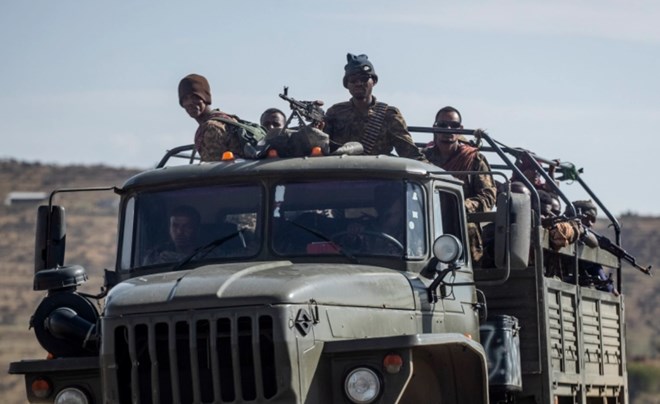
Monday December 20, 2021
Tigrayan rebels announce withdrawal from neighbouring regions, marking a turning point in Ethiopia’s three-month war.

Rebel Tigrayan forces fighting the central government troops say they have withdrawn from neighbouring regions in northern Ethiopia, a step towards a possible ceasefire after 13 months of the brutal war.
“We trust that our bold act of withdrawal will be a decisive opening for peace,” wrote Debretsion Gebremichael, the head of the Tigray People’s Liberation Front (TPLF), the political party controlling most of the northern region of Tigray, in a letter to the United Nations on Monday.
His letter called for a no-fly zone for hostile aircraft over Tigray, imposing arms embargoes on Ethiopia and its ally Eritrea, and a UN mechanism to verify that external armed forces had withdrawn from Tigray.
Getachew Reda, a spokesman for the TPLF, told the AFP news agency that Tigrayan troops were pulling out of the regions of Amhara and Afar.
“We decided to withdraw from these areas to Tigray. We want to open the door to humanitarian aid,” Getachew said.
The decision was made a few weeks ago, Getachew said, later tweeting: “We have just completed the withdrawal of our forces from both #Amhara&#Afar regions.”
But Prime Minister Abiy Ahmed’s spokeswoman Billene Seyoum said Monday’s rebel announcement was a cover-up for military setbacks.
“The TPLF have sustained great losses over the past weeks and hence are claiming ‘strategic retreat’ to make up for defeat,” she told AFP.
“There are still pockets in the Amhara region in which they remain as well as other fronts they are attempting to open the conflict.”
The war in Africa’s second-most populous nation has destabilised an already fragile region, sending 60,000 refugees into Sudan, pulling Ethiopian soldiers out of war-ravaged Somalia and using the army from the neighbouring nation of Eritrea.
Thousands of civilians have been killed, about 400,000 are facing famine in Tigray, and 9.4 million people need food aid across northern Ethiopia as a result of the conflict.
Debretsion said he hoped the Tigrayan withdrawal, from the regions of Afar and Amhara, would force the international community to ensure that food aid could enter Tigray.
The UN has previously accused the government of enforcing a de facto blockade – a charge the government has denied.
“We hope that by [us] withdrawing, the international community will do something about the situation in Tigray as they can no longer use as an excuse that our forces are invading Amhara and Afar,” Getachew told the Reuters news agency.
Other proposals in the letter include the release of political prisoners – thousands of Tigrayans have been detained by the government – and the use of international investigators to pursue those responsible for war crimes.
Last week, the UN agreed to set up an independent investigation into rights abuses in Ethiopia – a move strongly opposed by the Ethiopian government.
International mediators including the African Union and the United States have repeatedly tried to negotiate a ceasefire between the two sides to allow aid to enter Tigray, but both sides refused until certain conditions were met.
Meanwhile, state media reported on Sunday that the Ethiopian military is again in control of the town of Lalibela, famed for its rock churches.
The town, which has spiritual significance for millions of Ethiopian Orthodox Christians, has changed hands several times between Tigrayan and Ethiopian forces.
The conflict erupted last year between the federal government and the TPLF, which dominated Ethiopian politics for nearly 30 years before Prime Minister Abiy came to power in 2018.
In June, the military withdrew from Tigray after reports of mass killings of civilians, gang rapes and blocking of aid supplies. The government has said it has prosecuted individual soldiers although it has provided no details.
In July, Tigrayan forces invaded Afar and Amhara. The Ethiopian military launched an offensive at the end of November that pushed the Tigrayan forces back hundreds of kilometres.